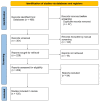Bridging the Gap: Harnessing Plant Bioactive Molecules to Target Gut Microbiome Dysfunctions in Amyotrophic Lateral Sclerosis
- PMID: 38785539
- PMCID: PMC11120375
- DOI: 10.3390/cimb46050271
Bridging the Gap: Harnessing Plant Bioactive Molecules to Target Gut Microbiome Dysfunctions in Amyotrophic Lateral Sclerosis
Abstract
The correlation between neurodegenerative diseases and the gut microbiome is increasingly evident, with amyotrophic lateral sclerosis (ALS) being particularly notable for its severity and lack of therapeutic options. The gut microbiota, implicated in the pathogenesis and development of ALS, plays a crucial role in the disease. Bioactive plant molecules, specifically volatile compounds in essential oils, offer a promising therapeutic avenue due to their anti-inflammatory properties and gut-modulating effects. Our narrative review aimed to identify microbiota-associated bacteria in ALS and analyze the benefits of administering bioactive plant molecules as much-needed therapeutic options in the management of this disease. A comprehensive search of PubMed database articles published before December 2023, encompassing research on cell, human, and animal ALS models, was conducted. After selecting, analyzing, and discussing key articles, bacteria linked to ALS pathogenesis and physiopathology were identified. Notably, positively highlighted bacteria included Akkermansia muciniphila (Verrucomicrobia phylum), Faecalibacterium prausnitzii, and Butyrivibrio spp. (Firmicutes phylum). Conversely, members of the Escherichia coli spp. (Proteobacteria phylum) and Ruminococcus spp. (Firmicutes phylum) stood out negatively in respect to ALS development. These bacteria were associated with molecular changes linked to ALS pathogenesis and evolution. Bioactive plant molecules can be directly associated with improvements in the microbiome, due to their role in reducing inflammation and oxidative stress, emerging as one of the most promising natural agents for enriching present-day ALS treatments.
Keywords: amyotrophic lateral sclerosis; essential oils; gut microbiome; neurodegenerative disease; oxidative stress; plant molecules.
Conflict of interest statement
The authors declare no conflicts of interest.
Figures
Similar articles
-
The Impact of Microbiota on the Pathogenesis of Amyotrophic Lateral Sclerosis and the Possible Benefits of Polyphenols. An Overview.Metabolites. 2021 Feb 20;11(2):120. doi: 10.3390/metabo11020120. Metabolites. 2021. PMID: 33672485 Free PMC article. Review.
-
The gut microbiome: a key player in the complexity of amyotrophic lateral sclerosis (ALS).BMC Med. 2021 Jan 20;19(1):13. doi: 10.1186/s12916-020-01885-3. BMC Med. 2021. PMID: 33468103 Free PMC article. Review.
-
Gut inflammation and dysbiosis in human motor neuron disease.Physiol Rep. 2017 Sep;5(18):e13443. doi: 10.14814/phy2.13443. Physiol Rep. 2017. PMID: 28947596 Free PMC article.
-
Gut-Modulating Agents and Amyotrophic Lateral Sclerosis: Current Evidence and Future Perspectives.Nutrients. 2024 Feb 21;16(5):590. doi: 10.3390/nu16050590. Nutrients. 2024. PMID: 38474719 Free PMC article. Review.
-
The alteration of gut microbiome and metabolism in amyotrophic lateral sclerosis patients.Sci Rep. 2020 Aug 3;10(1):12998. doi: 10.1038/s41598-020-69845-8. Sci Rep. 2020. PMID: 32747678 Free PMC article.
Cited by
-
Causal Relationships Between the Gut Microbiota, Inflammatory Cytokines, and Amyotrophic Lateral Sclerosis: A Mendelian Randomization Analysis.Brain Behav. 2025 May;15(5):e70571. doi: 10.1002/brb3.70571. Brain Behav. 2025. PMID: 40384011 Free PMC article.
References
Publication types
LinkOut - more resources
Full Text Sources
Miscellaneous



